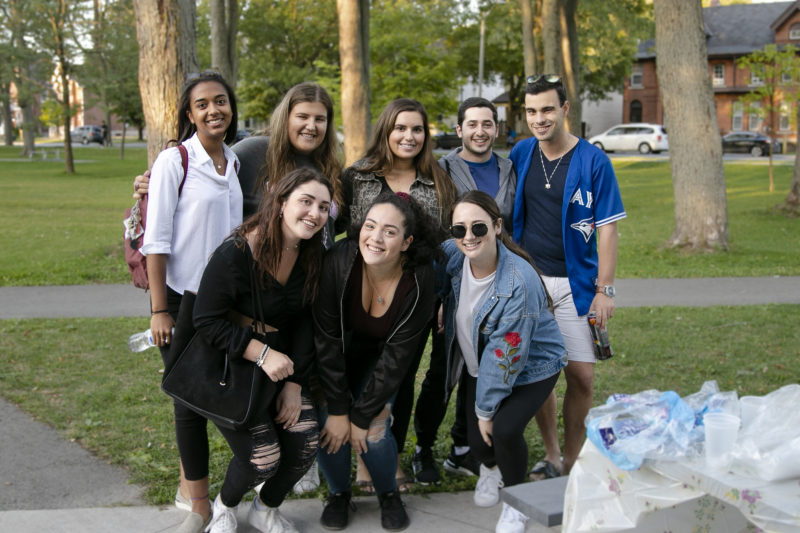Opinion
Holy work
An investment in Jewish talent is an investment in our collective future
In Short
Today, more than ever, prioritizing our team’s physical and mental health requires more than just platitudes. It requires action.
Working for the Jewish people is avodat kodesh, holy work. It is meaningful, rewarding, albeit challenging. The past two years have been especially turbulent and difficult, though simultaneously deeply impactful for both our students and our Hillel professionals.
Collectively, we have a combined quarter century of experience as Jewish communal professionals, with a specific focus on the under-25 demographic. In the best of times, and through deeply challenging ones, we have stood shoulder-to-shoulder with and empowered the next generation of proud, strong, resilient Jewish leaders. Their successes and their struggles (and there have been many of each) have been ours as well. The work of a Jewish community professional is far more than a paycheck — it is a part of our neshamah (soul), an intrinsic piece of who we are as people.

Courtesy Hillel Ontario
It has been more than two years since the beginning of the COVID-19 pandemic. As Jewish not-for-profit leaders in a time of collective trauma, profound change and instability, the past two years have underscored what we have always known to be true: an investment in Jewish talent is an investment in our collective future.
For Hillel Ontario, now the largest regional Hillel in the world, the cultivation, retention and well-being of our team has always been at the heart of our mission and strategy. Thanks to the generosity of visionary philanthropists, we have taken enormous leaps forward to ensure our organization remains one of the best places to work – in the Jewish world, and beyond.
Today, more than ever, prioritizing our team’s physical and mental health requires more than just platitudes. It requires action.
And, so, we have been taking meaningful steps to ensure our team has the support and tools they need to be at their best — not just because it’s the menschlich thing to do, but because it allows them to more successfully accomplish their work in support of the very constituents that rely on them.
For the past 26 months, the world has been on a heightened state of alert; and it has taken its toll universally, though uniquely for each person. Despite the state of the world (in many respects, because of it), our team has continued providing critical services to our constituents – many of whom are, in their own right, struggling. This work is intensive and vital.
As the airline safety briefing goes, should oxygen masks fall from the ceiling, securely fasten your own before assisting others around you.
And, so, this summer, we are leaning in, and providing space for our team to recharge, recalibrate and re-envision.
From May through July, we will be piloting a summertime four-day workweek and encouraging our staff to use each Friday to breathe — to take a yoga class, get out into nature or enjoy time with friends and family they have not been able to see in far too long. We are also carrying over up to one unused week of vacation time from the past year through the summer, and vigorously encouraging our team to use them.
To be clear, there is no expectation that any of us will work less hard during the week; we trust our staff to use their time efficiently, and research indicates that a four-day work week has no adverse impact on productivity. However, there is an expectation that we will work differently and with an eye towards recovery. Should this model be successful – and we expect that it will – we will look to make this quasi-shmita an annual summer occurrence.
We are also reshaping how we view success. No longer can outputs be the measure of impact; rather it is outcomes that must drive our organizational efforts. Among the outcomes and impacts we continue to track are the ways that Hillel’s presence on campus engages and shapes the next generation.
Around the world, students who engage with Hillel are 90% more likely to take a leadership role in the Jewish community, 130% more likely to host Shabbat dinner for their friends and family, and 70% more likely to describe themselves as being very connected to Israel. We are also focussed on the the ways in which we address antisemitism, with qualitative data demonstrating that from the fall of 2018 to the spring of 2021, incidents of antisemitism decreased 70% on Ontario campuses with Hillel advocacy coordinators.
Finally, we know that in order to attract and retain top talent, we must foster a best-in-class organizational culture, grounded in the values of flexibility, community, respect and a commitment to a shared mission. We will be taking meaningful steps to offer competitive salaries and benefits, promote a healthy work-life balance, and offer ongoing coaching and professional development as well as education and training opportunities.
While the secondary impacts of the pandemic have only just begun to emerge, their effect on the workforce, the ways in which we engage with each other, our teams, and with the students we serve, has been profound, and will be long lasting. As the world begins to see glimmers of light at the end of a long tunnel, we look ahead with optimism and enthusiasm. But, it will not be business as usual.
Beverley Shimansky is the chief campus & engagement officer and Jay Solomon is the chief communications & public affairs officer for Hillel Ontario.












